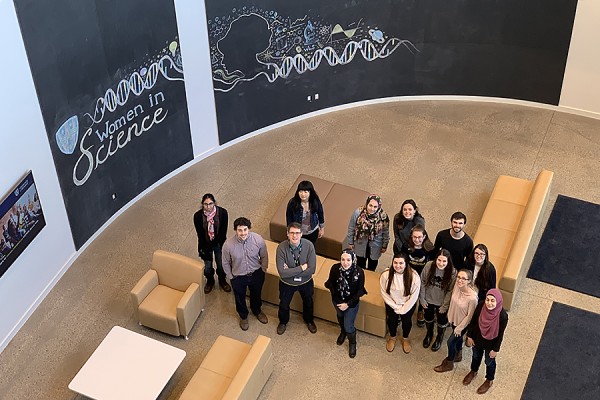 Members of biology professor Phillip Karpowicz’s lab study the circadian rhythms of the intestine.
Members of biology professor Phillip Karpowicz’s lab study the circadian rhythms of the intestine.
Just about every living organism has adapted to a 24-hour internal cycle in response to the Earth’s 24-hour revolution. These circadian rhythms are caused by an internal clock running in all cells at daily intervals.
The circadian rhythms driven by this internal clock determine sleepiness and alertness, daily increases and decreases in body temperature, and even how many hormones are secreted.
Phillip Karpowicz, assistant professor and chair of the biology graduate program, and the members of the Karpowicz Lab, study the circadian rhythms of the intestine utilizing fruit flies to model the biological processes that happen in all animals.
For a recent publication, Dr. Karpowizc and his doctoral student Kathyani Parasram studied how circadian rhythms regulated the intestine stem cells.
They accomplished this by creating bioengineered fruit flies known as clock reporters, which would detect the circadian rhythms of the cells by producing florescent proteins that glowed in the dark.
“You could actually see the molecular process in real-time through the signal in these clock reporters,” says Karpowicz. “And these are living fruit flies that were used for the study. They have reporters in all the cells in their body that reflect the activity of circadian rhythms in the living animal.”
The goal was to build these clock reporters and use them to study all the different cells of the intestine, and to see how the circadian rhythms operated within these cells.
Parasram’s project utilized a variety of genetic tools to view the different cells, to then image them, and actually see what was happening in the tissue.
“Before we began studying this,” Parasram says, “it was generally thought that if a tissue had circadian rhythms, then all the cells in that tissue would have those rhythms present as well. But we found that this wasn’t the case.”
Their results indicated that only some cells in the tissue had circadian rhythms, while others did not. Surprisingly, the hormone-producing cells themselves had no ability to keep track of time, which meant that they must have been controlled by other cells that did to make 24-hour rhythms in hormone production.
“The stem cells of the system are also very sensitive to what is going on in the tissue,” says Karpowicz. “Some of the cells of the tissues of the body have a way to track time of day, and to behave according to that time of day, so that they do not do things at inappropriate times. But some cells don’t have that ability, and that opens up all these additional questions to why some cells would need that, and why other cells wouldn’t.”
This work to study circadian biology in Karpowicz Labs could also change the way medicine is practised.
“Circadian biology has been largely been ignored in medicine,” says Karpowicz. “But a lot of people are now discovering that the cells of all organisms on this planet have hard-wired 24-hour timing, and this has an impact on therapies and diagnosis, which are being done according to our work and life schedules rather than the circadian schedules of the cells in our bodies.”
—Darko Milenkovic

